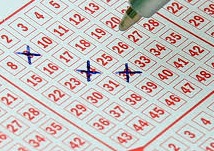 With etymological origins in the French loterie , a lottery is a drawing or raffle that awards cash, items, or another reward to the winners. It is a game of chance .
With etymological origins in the French loterie , a lottery is a drawing or raffle that awards cash, items, or another reward to the winners. It is a game of chance .
To participate in the lottery, it is necessary to have one or more numbers , which are usually distributed in tickets or ballots . Thus, the player buys the numbers before the draw takes place: if those numbers appear in the corresponding play, he obtains a prize .
The numbers are drawn from a container or a raffle completely at random : it is not possible to choose them. Therefore, to win the lottery you cannot do anything more than buy a number, since there is no possibility of appealing to any skill or talent to have more chances.
A game of this type that is promoted by the State is called a national lottery . A state agency, in this framework, puts tickets for sale with the numbers that are then drawn in a lottery.
The money raised by the national lottery through tickets is usually used for social assistance . In this way, citizens who buy the numbers collaborate with those most in need while aspiring to be favored by luck.
The idea of lottery also allows us to refer to a board game . In this case, the lottery is based on the distribution of cards with numbers among the players and the drawing that allows the winning numbers to be determined. The player who completes the numbers on his card first is the winner.
Phrases like "hit the lottery" or "hit the lottery" , finally, refer to being benefited by something unexpected. For example : «I won the lottery! My parents will go on a trip and I will have the house to myself for the entire weekend," "With her new job, Claudia won the lottery: she has a very high salary and travels all over the country staying in five-star hotels." .
 In these last two examples we can see quite clearly the different ways in which human beings perceive the idea of " luck ", both good and bad. This can - and usually - changes throughout all stages of life, but it responds to the way of being of each individual. While for a teenager being left alone at home can mean glory, the demands of an adult usually point to professional success and purchasing power.
In these last two examples we can see quite clearly the different ways in which human beings perceive the idea of " luck ", both good and bad. This can - and usually - changes throughout all stages of life, but it responds to the way of being of each individual. While for a teenager being left alone at home can mean glory, the demands of an adult usually point to professional success and purchasing power.
Of course, this is not always the case, but there are exactly opposite cases (people who from a young age aspire to achieve great things at a professional level and adults who are content with watching TV on the weekend) and countless others who are between these two. .
The lottery is very popular in certain parts of the world, with marked differences that can be seen with the naked eye. For example, in Spain it is part of the culture to an extent that is impossible to ignore: lottery sellers make themselves heard on the streets of the most important cities and people do not let a draw pass without participating. In Argentina, on the other hand, the lottery goes more unnoticed.
One of the reasons why this game is so popular is the opportunity to "get rich " from one second to the next, a dream shared by almost all human beings from the working classes. Life is very difficult for those who have to get up early every day, travel in poor conditions to their workplace and then stay there until night mistreating their bodies; The mere possibility of leaving this painting behind is enough of an incentive to keep going.
